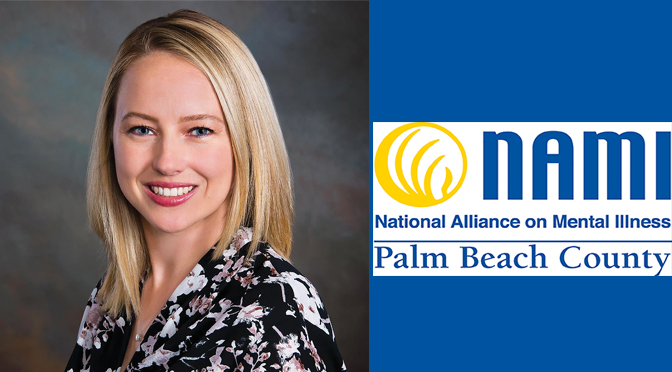Support Group For Families Navigating Mental Illness Now Meeting in Wellington
Four decades ago, two mothers gathered together in Wisconsin, thirsting for mutual understanding and in desperate need of empathy and support. Each woman had a child suffering from schizophrenia, and from small beginnings around a kitchen table, the National Alliance on Mental Illness — or NAMI — was created.
The purpose of the organization is to support families of those with mental illnesses by providing education, advocacy and support, striving to see families and their loved ones sail smoothly through stormy seas.
Now, a NAMI family support group has arrived in Wellington.
Since its conception in 1979, NAMI has grown to an organization consisting of 1,000 affiliates nationwide, with the Wellington group falling under the umbrella of NAMI Palm Beach County.
While the national nonprofit is currently based in Virginia, it is constantly establishing and equipping affiliate branches around the country. These individual branches then continue to organize family support groups within their respective areas, the newest in Palm Beach County being the Wellington group.
The members began their monthly meetings in March of this year, meeting at Palm Beach County Fire-Rescue Station 30 at 9610 Stribling Way. They continue to meet at the same location, beginning at 3 p.m. on the third Sunday of every month. Each meeting is different, but they all center around the encouragement and support of family members of individuals with mental illnesses.
This isn’t the first NAMI group that has attempted to set sail in Wellington. According to Katherine Murphy, the director of programs for NAMI Palm Beach County, there was a Wellington group that tried to start up a few years ago, but it never earned its sea legs. That’s when Tracy Bem stepped forward.
While Bem had frequented the previous Wellington group, she started getting more involved with NAMI. “I started hooking up with the NAMI group and taking all the classes again, and I realized the need for a support group out in the western communities,” Bem said. “That’s when I talked to them, and I took the training so that I could do it, because it definitely meets needs.”
There is a significant stigma surrounding people struggling with mental health issues. Both Bem and Murphy emphasized the importance of experienced and empathetic help when dealing with the issues of loving somebody with a mental illness.
“When you have somebody with a mental illness, you need a resource,” Bem said. “You need people with the same situation.”
Murphy noted that people without an accepting and understanding community may have a lower chance of caring for their loved one as effectively as individuals who do have this type of support system. “If families are isolated, alone, they don’t have resources, they don’t have support,” Murphy said. “They might not have that endurance to continue to support their loved ones.”
According to Murphy, the hope is that these NAMI family support groups can reinforce the family members and provide them with helpful tools and resources to press on.
Bem added that people who don’t have a loved one with a mental illness don’t understand the frequent difficulties of the situation. Bem compared the seriousness of mental health conditions to that of a disease like cancer. Unless people see mental illness as an actual — often deadly — disease, she said, they tend to think the family member is merely going about things the wrong way.
“They blame it on you, but when it’s a mental illness, you need somebody who totally understands it to share with,” Bem said. “So that is a huge need. I mean, there should be a support group every day of the week.”
NAMI, according to Murphy, works to educate the family members on the best ways to communicate with a mentally ill family member.
“Sometimes, if we don’t have training in communication or different techniques, different ways to work around things, we might not have the whole toolkit,” Murphy said. “One of the things about NAMI, the family support group, and everything we try to do, is to empower families and to give them the tools and resources. There’s the emotional support, but then there’s also the very concrete tips and tricks.”
Each family support group facilitator goes through a two-day training of the NAMI model and guidelines, and they are all volunteers who are loved ones of a person with mental illness.
“What we offer at NAMI is the ‘lived experience,’ so our groups aren’t led by clinicians, they’re led by family members,” Murphy said. “It’s family members speaking to other family members — people who understand what it’s like to sit in the waiting room, people who understand what it’s like to have to call 911 when times get tough, and people who know what it’s like to go on that journey.”
For this reason, NAMI considers itself a complement to clinical care and not a replacement for it.
Along with the family support groups, NAMI provides services such as NAMI Connection, a group for people with mental health conditions, as well as mentoring programs, mingling activities and more.
Everything NAMI offers is free-of-charge, Murphy noted.
“NAMI’s goal is to help the family to be there for the long term,” Murphy said. “We want to provide them with the tools, support and resources to continue to support their loved one for the rest of their life.”
If you have a loved one struggling with a mental illness, or if you would like to learn more about NAMI Palm Beach County programs, call (561) 588-3477 or visit www.namipbc.org.
